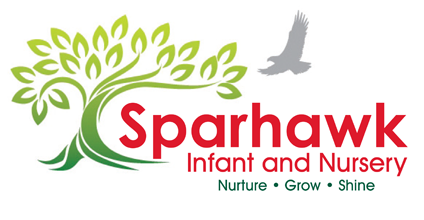At Sparhawk we provide a high quality, creative curriculum within a caring and inclusive community.
Over the last 5 years we have been on a journey with our curriculum. We have identified who are children are, and where what we want them to be when they leave Sparhawk. We have planned backwards. With the end goal in mind.
What will a Sparhawk child learn?
Sparhawk has its very own progressive curriculum- based on the National Curriculum 2014. Each subject (or area in EYFS) has been scrutinised and the key knowledge has been identified- in all areas of the curriculum and beyond from Nursery to year 2. Key knowledge is revisited and we used a spiralised approach to ensure our children have opportunities to revisit and retain knowledge.
How do we deliver the core knowledge and skills and bring learning to life?
We use a thematic approach. Each term has a whole school theme. We use these themes (circus, dinosaurs, jungle, castles etc) to provide out children with a hook! We immerse them into their learning through purposeful, meaningful contexts. These themes have been mapped out over a three year period. We have thought about the key knowledge we want our children to know, in order for them to be: active, knowledgeable members of their community
Sparhawk skills and values
Underpinning our progressive curriculum, we have Sparhawk’s values and Sparhawk’s skills for learning (represented through coloured gems). We believe these skills are critical for any child to achieve in education and beyond. We aim to provide a classroom environment where independence, thinking skills, collaboration and active learning are developed at the same time as the curriculum knowledge is acquired. We aim to equip the children with skills that will enable them to be lifelong learners. Sparhawk’s skills for learning are taught explicitly and each skill is represented by a coloured crystal ball
What else makes up Sparhawk’s Curriculum?
- Sparhawk 50 things to do – a list of activities,that we believe , our children need to experience before they leave us.
- WOW moments- we like to launch each term off with a WOW moment, this includes visitors and trips.
- Sparhawk families- each Friday our children mix up across KS1 and take part in enrichment activities such as mindfulness, arts and crafts, forest schools etc.
- Philosophy- opportunities to debate, reason and discuss.
- Class tree- each class has a tree that they observe and watch the changes over the year.
- Active – we place huge importance on a healthy mind and a healthy body, from the daily mile to cosmic yoga.
- Aspirational week- celebrated each year, we invite in an array of professions to speak to our children and inspire.
- Inter-generational week- each year we provide out children opportunities to mix with older generations from visiting care homes to inviting grandparents into lunch.
- Class garden- each class has a garden that they plant seasonal veg and plants.
- Singing – Sparhawk is a singing school. We sing daily, appreciate music and take parts in many community events.
- Outside environment- we are incredibly fortunate that we have such a vast space. We have created spaces for the children to develop physically, socially and emotionally.
- Talent time- this is the last Thursday of each month where our children have an afternoon to work on their talent. This can be presented in praise assembly on a Friday.
- Big arts week- annual celebration and appreciation of The Arts.
- Community cohesion- opportunities to bring the community and go out into the community.
- Extra -curricular clubs- football, gymnastics, sign language, lego, science, gardening to name but a few.
The list goes on….
Click here to see the Sparhawk Curriculum 2023
From September 2015, all children in Key stage 1 (KS1): Year 1 and Year 2 children will have to follow the new National Curriculum.
Every state-funded school must offer a curriculum which is balanced and broadly based (Section 78, 2002 Education Act) and which:
- Promotes the spiritual, moral, cultural, mental and physical development of pupils at the school and of society;
- Prepares pupils at the school for the opportunities, responsibilities and experiences of later life.
The National Curriculum in England, 2013, page 6 states its aims as:
- To provide pupils with an introduction to the essential knowledge they need to be educated citizens.
- To introduce pupils to the best that has been thought and said.
- To help engender an appreciation of human creativity and achievement.
On page 5 it says that the national curriculum:
- Is just one element in the education of every child. There is time and space in the school day and in each week, term and year to range beyond its specifications.
- Provides an outline of core knowledge around which teachers can develop exciting and stimulating lessons
The following shows the curriculum structure for years 1 and 2 as outlined in the National Curriculum for England (2013), page 7. The curriculum is organised into 12 subjects, some of which do not have to be taught in these year groups:
| Core subjects | |
| EnglishMaths
Science |
YesYes
Yes |
| Foundation Subjects | |
| Art and designCitizenship
Computing Design and Technology Geography History Languages Music Physical Education |
YesNo
Yes Yes Yes Yes No Yes Yes |
All schools should make provision for personal, social health and economic education (PSHE). At Sparhawk we are following the Excellence and Enjoyment Document: Social and Emotional Aspects of Learning, 2005.
We also have to teach religious education (RE) to all children at our school unless they are withdrawn from it by parents. We follow the Norfolk Agreed Syllabus for RE, as there is no national curriculum for this subject. Please review our RE Curriculum using the link below.













